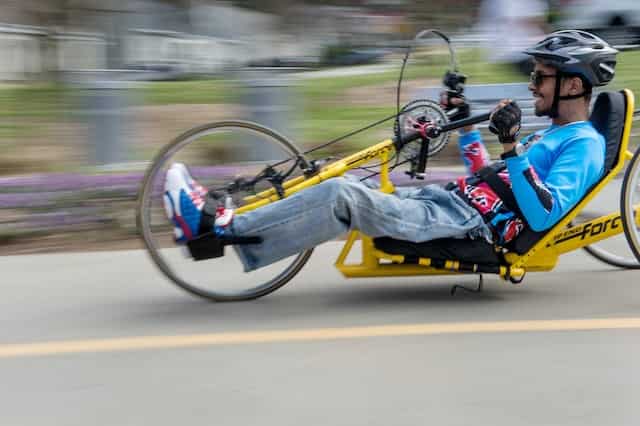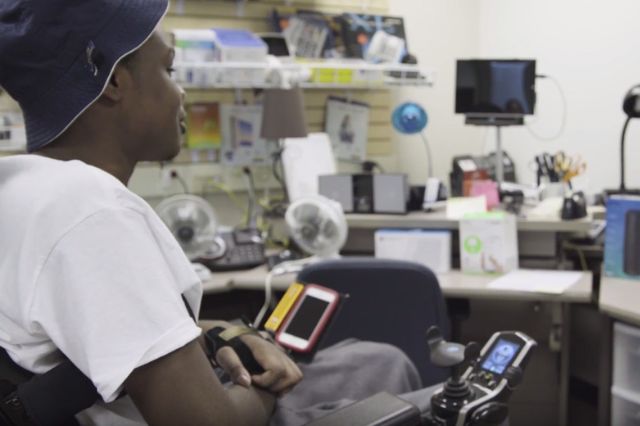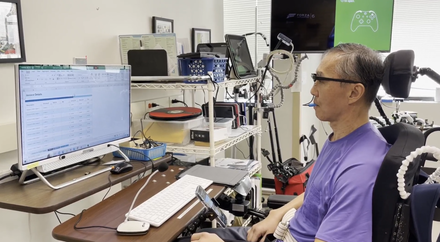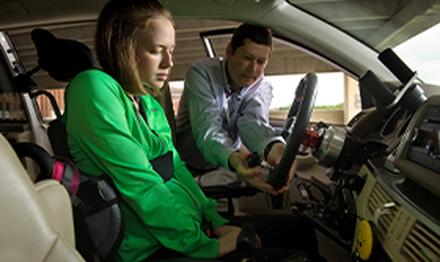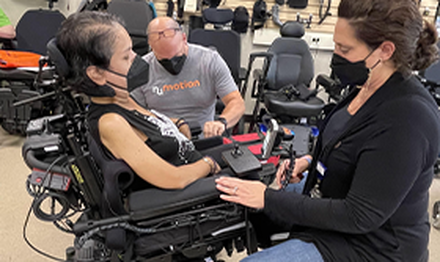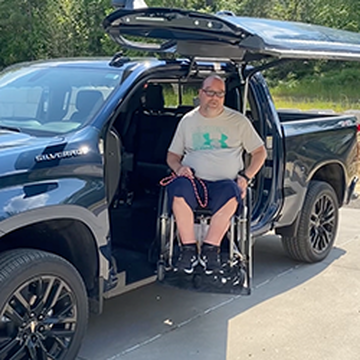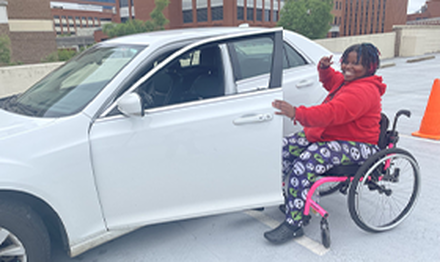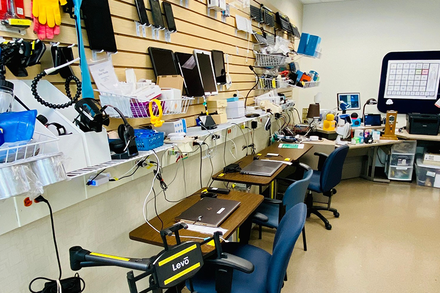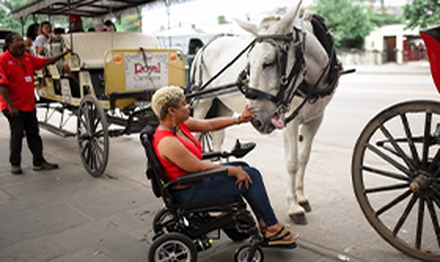Center for Assistive Technologies
Creating pathways to a more fulfilling life after injury or illness
Following a neurological injury or condition, you may face challenges related to reduced mobility and impaired cognitive functions. These challenges can affect your ability to perform daily activities such as accessing your device, controlling your home environment, driving, and moving around. To enhance autonomy, many individuals turn to assistive technology, leveraging a range of tools and devices to reclaim or maintain their independence.
At the Center for Assistive Technologies, we possess a unique understanding of these challenges and offer personalized solutions that support the rehabilitation and recovery journey. Situated within Shepherd Center, a top-ranked neurorehabilitation hospital, our Center is actively immersed in testing, developing, and modifying assistive technologies.
Through close collaboration with therapists, assistive technology professionals, engineers, and research teams, we strive to enhance rehabilitation outcomes, prevent decline and regression, and improve overall well-being, allowing you to lead a more accessible life post-injury or illness.
Assistive Technology Services
Due to the extensive capabilities of the Center for Assistive Technologies, we can seamlessly integrate our services, addressing various needs that often intersect. For instance, we may conduct a seating evaluation to enhance positioning before assessing switch access for a communication device. In other cases, a wheelchair evaluation might be required to ensure an adequate wheelchair is in place before a driving assessment.
A Team Approach to Assistive Technology
At the Center for Assistive Technologies, we understand the complexities of traumatic injuries and neurological conditions. That’s why we take a multidisciplinary approach, collaborating closely with a team of occupational therapists, physical therapists, certified driver rehabilitation specialists, and assistive technology professionals who work together to provide the highest standard of care. Together, we combine our expertise and experience to help you achieve the highest level of independence possible.
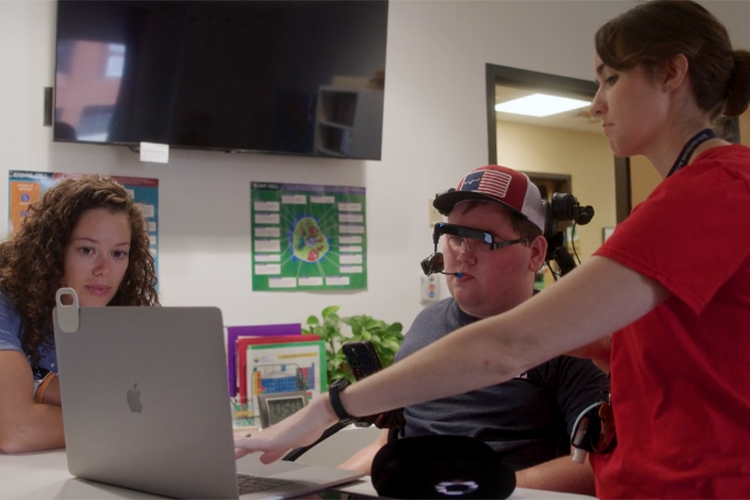
Client TestimonialNow, I can get into my car and go get groceries when I want to. I can drive myself to the state park and push myself around on the trails to exercise on my own. I can drive to my daughter’s house to meet my second grandchild. I can visit friends and do anything anyone else can do. Getting this ability back has been a life-changing experience. It’s freeing.
Ben ElstadDriving Evaluation and Rehabilitation Program
Inspiring Innovation: Assistive Technology Research at Shepherd Center
The Center for Assistive Technologies engages in research to offer tailored solutions for diverse disabilities while enhancing accessibility, mobility, and communication. In 2025, we are set to broaden the scope of our assistive technology and research initiatives by establishing Shepherd's Innovation Institute. This 30,000-square-foot facility will be located within the new Marcus Center for Advanced Rehabilitation and include an assistive and rehabilitation technology showroom, allowing individuals to trial technologies before purchase.
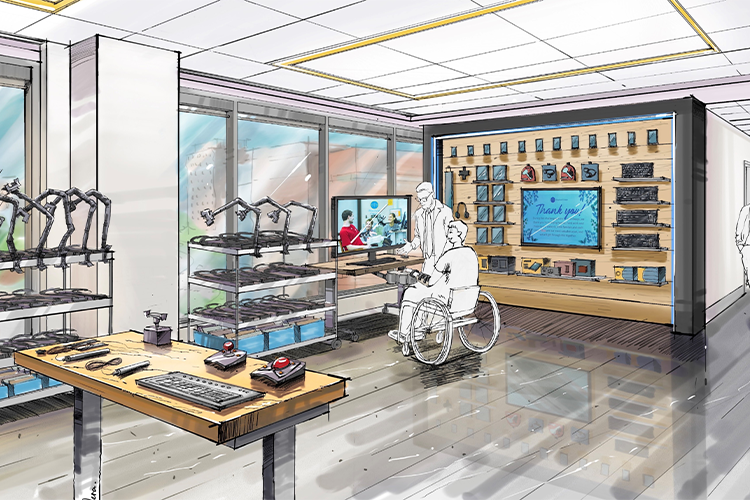
No, assistive technology can benefit people with a diverse range of conditions, including physical disabilities, visual impairments, hearing loss, cognitive and learning disabilities, communication-related disabilities, neurological conditions, age-related conditions, and more. Assistive technology encompasses a wide range of devices, tools, software, and systems that are tailored to meet the specific needs of everyone.
Selecting the right assistive technology involves carefully assessing individual requirements, preferences, and goals. At the Center for Assistive Technologies, we offer a comprehensive evaluation process that focuses on the specific aspects of the injury or condition, daily activities, and individual preferences. Innovative solutions are explored through collaboration between therapists and patients, and a personalized treatment plan is created to address each unique need.
The Center for Assistive Technologies has an extensive inventory of adapted vehicles, custom wheelchairs, switches, environmental control devices, and other assistive technology for trial and evaluation. Users can assess the compatibility of existing assistive technology with their unique needs and preferences or collaborate to create something new.
During an initial evaluation, we work with patients to identify their goals, interests, needs, and physical abilities. We trial equipment and adjust solutions based on their physical progress and goals. Some things we may work on during sessions include:
- Alternative access methods for phones, tablets, computers, and alternative/augmentative communication devices. This may include an introduction to built-in accessibility features, adaptive styluses, alternative mice, and voice recognition software.
- Eye gaze and other high-tech alternative access methods.
- Commercially available smart speaker education and smart home integrations. High-tech environmental control units.
- A variety of switch access and scanning methods, basic device access, and intermediate/complex tasks.
- Integrated assistive technologies on power wheelchair drive controls (Bluetooth, Infrared, and USB).
- Adaptive gaming and therapeutic gaming.
- Calling for assistance in the home and in case of an emergency.
- Device mounting solutions.
- Return to school/return to work solutions.
- Drinking.
Patients at Shepherd Center who have experienced a cervical-level spinal cord injury, neurological diseases such as Guillain Barré Syndrome or West Nile, or upper extremity amputation are automatically scheduled for evaluation and support by the Assistive Technology Therapists during their inpatient stay. All other inpatients can be referred to the Access Technology Lab by their therapists.
Shepherd Center can provide guidance and recommendations on purchasing equipment, but Shepherd Center does not sell equipment or facilitate the purchase of equipment.
Every state has a state-funded assistive technology program. We encourage all patients to contact their state program when they return home. The Georgia program is called Tools for Life. You can also search the National Assistive Technology Act Technical Assistance and Training (AT3) Center website for your state-specific program.
Certainly! In most cases, individuals can still drive your car the "standard" way even after it has been modified for your use.
The Shepherd Center driving specialist provides recommendations to your doctor, who ultimately decides on your license status.
Your initial driving rehabilitation and adaptive equipment training will occur using Shepherd Center-owned vehicles. We have seven cars and vans with various low- and high-tech adaptive equipment.
Shepherd Center can provide additional training using the patient's vehicle after the initial evaluation and driving rehabilitation using Shepherd Center-owned vehicles is completed.
Your first appointment will include an initial evaluation with your specialist to discuss your driving and vehicle needs, lasting about three hours.
- The first hour is a clinical assessment. A therapist evaluates your arms, legs, vision, cognition, and balance for driving.
- The second half of the appointment is a road assessment. You drive a vehicle with the adaptive equipment required, if any.
Every patient is unique, and any additional appointments necessary will be made after the evaluation. Once your evaluation is complete, our care team will work with you to develop a personalized driving rehabilitation and adaptive equipment plan.
Shepherd Center can provide guidance and recommendations on purchasing vehicles and adaptive Equipment, but Shepherd Center does not sell vehicles or facilitate the purchase of vehicles.
Shepherd Center can recommend adaptive equipment suitable for the client's personal vehicle. However, we do not install or produce the adaptive equipment.
This process is similar to a doctor prescribing a script for medication. While your doctor can recommend the prescription, they are not involved in selling or manufacturing the medicine.
Absolutely. We have familiarity, extensive knowledge, and experience with manual wheelchairs, power wheelchairs, and scooters.
We can write prescriptions for wheelchair/seating parts, but we cannot order parts on your behalf. The equipment seen in the clinic is for trial purposes only and is not for sale. After the equipment is trialed and your evaluation is complete, recommendations will be made for what should be ordered. All purchases must be coordinated between you and your wheelchair supplier.
We can make adjustments to wheelchairs, but we cannot make repairs. Coordination with your wheelchair supplier is needed for repairs and replacement of parts.
Your first appointment will include an initial evaluation to discuss your seating and mobility goals with your specialist.
Once your evaluation is complete, our care team will work with you to develop a personalized seating and mobility plan, which may include adjustments or modifications to your current wheelchair, a new mobility device, training, and education regarding the use of equipment
If you are being evaluated for a new manual or power wheelchair, anticipate returning for at least one additional appointment to trial equipment, take body measurements, and finalize the prescription for your equipment. Once the evaluation, trial of equipment, and prescription are complete, the seating therapist writes the report and medical justification for the recommended equipment.
After your appointment, we will obtain your physician's approval of our recommendations. The signed report from your evaluation will be sent to your equipment supplier.
Your equipment supplier will ask your insurance company for approval, which may take at least 4‐6 weeks. Once approved, your supplier will contact you to order all the equipment.
It may take an additional 4‐6 weeks, or longer, to receive your equipment. Contact your wheelchair supplier for updates on the status of your equipment.
You will be notified once your equipment is ready to be delivered. You will then be asked to make a follow‐up appointment with our clinic for fitting, adjustments, and training in your new equipment.
If you have questions regarding repairs or maintenance of your equipment, please contact your supplier. Your supplier’s contact information was provided at the evaluation or should be located on the chair itself.
If you have questions regarding your skin, balance, posture, or how to use your equipment, please make an appointment with our clinic to see a therapist.
A face-to-face visit is required for patients with Medicare funding who are requesting a power wheelchair, power assist device, or scooter. Medicare law requires that patients have a face-to-face examination by their physician to determine if a power mobility device is reasonable and necessary. A work order signed by the provider is also required.
The work order, signed by your provider, must include the following information on the prescription for your wheelchair.
- Your name
- Description of the item ordered (e.g., power wheelchair/manual wheelchair/scooter)
- Date of completion
- Pertinent diagnosis/conditions that relate to the need for a power mobility device
- Length of need
- Provider signature
The face-to-face examination should include the following:
- List mobility limitations (diagnoses) and their impact on your mobility-related activities of daily living (MRADLs) in your home. Medicare defines MRADLs as bathing, dressing, feeding, grooming, and toileting in customary home locations.
- A comprehensive history and physical examination that includes height and weight.
- Prognosis.
- Physical examination with a focus on functional assessment, assessing difficulty in performing ADLs in standing or with the patient's current device.
- Past use of a cane, walker, manual wheelchair, scooter, or power wheelchair.
- Articulating why a cane, walker, or manual wheelchair cannot meet the patient's mobility needs within the home.
- Documenting the need even if the patient is referred for a PT/OT wheelchair evaluation.
The physician must keep in mind that Medicare requires that the device must be necessary for mobility inside the home to complete ADLs. Medicare will not fund equipment that is needed solely for community use.
Suppliers will request face-to-face documentation from the physician's chart notes/medical records. The evaluation by the PT or OT does not take the place of the face-to-face requirement.
Georgia Medicaid requires prior approval before an appointment can be scheduled. Please take the following steps to help us obtain Medicaid authorization for your visit.
- Call the Shepherd Center Scheduling Department at 404-352-2020 and ask for outpatient scheduling to begin the process.
- If Medicaid is your only insurance coverage, you must see your primary care physician listed on your Medicaid card or your primary care physician and obtain a referral for “PT evaluation for seating and mobility.”
- Your physician can complete the referral form and fax the information to 404-350-7356. Your physician will need to send a copy of your medical history and recent progress note(s) that list your chronic (long-term) and acute (short-term) illness. This documentation must justify a need to be seen by a therapist for a wheelchair or seating evaluation. Medicaid requires that your provider has seen you within six months of the wheelchair appointment.
- Once we receive this information from your doctor, a request for authorization will be sent to Medicaid. This process takes 2-3 weeks.
- If Shepherd Center receives authorization for the evaluation, the scheduling department will contact you to schedule an appointment.
Medicaid only authorizes one visit within a specific time frame.
You must keep your appointment. Please arrange transportation so that you can keep this appointment. If you cancel or miss the appointment, we cannot reschedule another appointment without getting a new Medicaid authorization.
The Center for Assistive Technologies requires all new patients to initiate a referral through their healthcare providers or specialists. Please visit our appointments and referrals page for specific instructions on beginning the referral process.
We want to make the most of your visit here just as much as you do. Visit our appointments and referrals page for tips on what to do and what to bring before your first evaluation.
Absolutely. It is very helpful if a caregiver or health advocate accompanies you to your appointment to help take notes, ask questions, and provide emotional support.
It is very important that you attend all scheduled appointments. While we understand that emergencies and other unexpected situations do arise, we request you provide us with 24-hour notice if you cannot make an appointment and need to reschedule.
It is very important that you attend all scheduled appointments. We have a strict five-minute grace period. If patients arrive more than five minutes after their appointment, we will reschedule the appointment to a later date.
Contact our Assistive Technology Case Manager to determine the costs for our various services that are right for you.
We accept most major health plans, including traditional insurance, managed care plans, Medicare, and Georgia Medicaid. We encourage you to confirm that your health plan covers specialist services before making an appointment. Learn About the Insurance Plans We Accept.
Please call our Financial Services Department at 404-350-7320 Monday through Friday to ask questions about your statement.
Securing financial support for assistive technology can involve several steps and may vary based on your location and specific needs. Potential funding options could include health insurance, grants, or low-interest loans. Our dedicated Assistive Technology Case Manager is available to provide guidance and assistance throughout this process. Contact our case manager to learn more.
Contact your local Vocational Rehabilitation office to see if you qualify for assistance. If you are a Georgia resident, learn more at the Georgia Vocational Rehabilitation Agency office website.
Monday to Friday
8:00 a.m. - 4:00 p.m. ETThe Center for Assistive Technologies is conveniently located on the main campus of Shepherd Center in Buckhead Atlanta, next to Piedmont Hospital. We are easily accessible from Interstates 75/85 and just 16 miles from Hartsfield-Jackson Atlanta International Airport. Learn more About Directions and Parking.
If you are arriving for a new evaluation or any of our assistive technology services, you will check in at the Center for Assistive Technologies at Shepherd Center on the 3rd floor of the main Shepherd Center building.
Upon entering Shepherd Center via the visitors’ parking bridge, continue down the hall to the Marcus Woodruff elevators on your right before the Security Desk across from Shepherd Apothecary.
Take the elevators to the 3rd floor, go to your right, and check in at the registration desk. Download Our Campus Map.
Yes. Free and convenient covered parking is available for all patients in the Shepherd parking deck behind Shepherd Center.
Yes. ADA parking is available on all garage levels, with van-accessible spaces on the ground level. Direct access to the hospital is accessible by an elevator on each level of the parking deck. Patients can also be picked up or dropped off adjacent to the Marcus-Woodruff Building Entrance. Transport chairs may be borrowed from our Security Desk if needed by visitors.
Shepherd Center has partnered with several nearby hotels to offer discount room rates for patients and/or family members. Rates may be subject to room availability. Each hotel offers various services, including wheelchair-accessible guest rooms for persons with disabilities. Be sure to ask for the Shepherd Center Rate when contacting these hotels. View Local Accommodations.
Center for Assistive Technologies News and Stories from Shepherd Center’s Newsroom
Contact the Center for Assistive Technologies
Questions about community support, advocacy for assistive technology, modification resources, funding options, and beyond? We're here to help.

